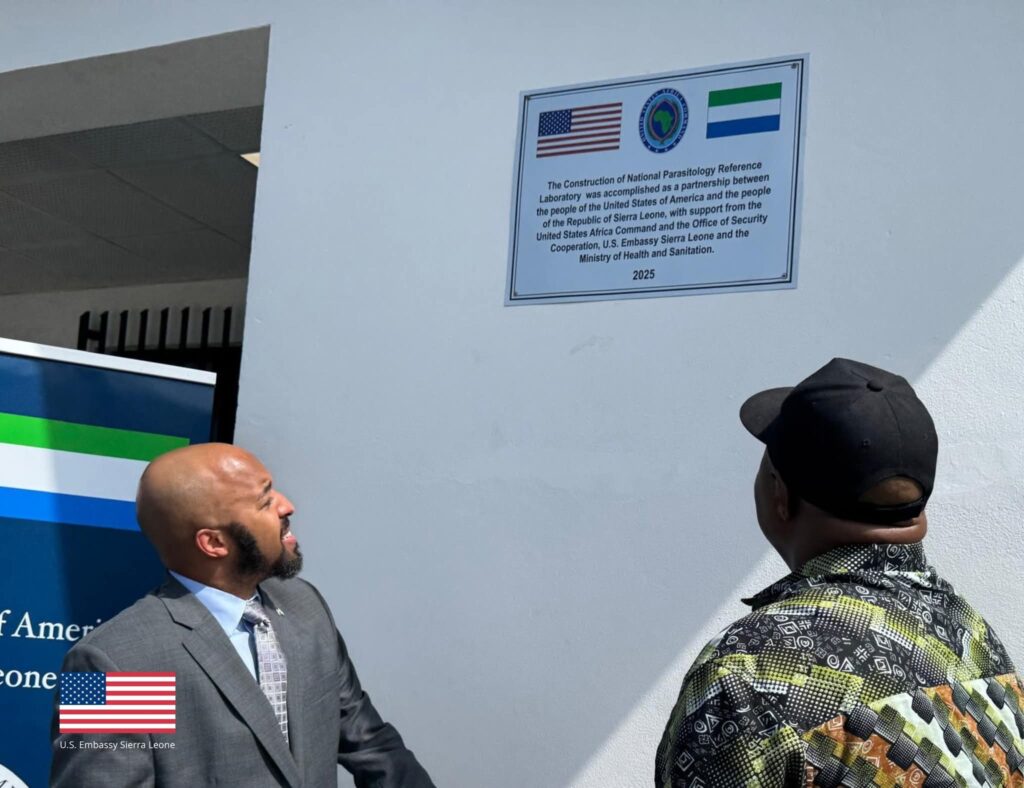A new diagnostic laboratory will help Sierra Leone strengthen its response to parasitic diseases that affect the country.
Government authorities received the new National Parasitic Diseases Laboratory and Training Center in late September during a handover ceremony in Freetown.
The new laboratory is the latest installment in Sierra Leone’s ongoing $108 million public health partnership with the United States and U.S. Africa Command.
During the handover, U.S. Embassy Chargé d’Affaires Jared Yancey said the partnership between Sierra Leone and the U.S. reduced malaria prevalence among children under 5 in Sierra Leone from 40% in 2016 to 22% in 2021.
Built by the U.S. Army Corps of Engineers in 2024 and 2025, the new facility will enhance Sierra Leone’s ability to address outbreaks of malaria and other parasitic diseases endemic to the country, according to authorities.
The new laboratory will play a critical role in a country that records more than 2 million cases each year, Yancey said during the handover.
Sierra Leone is home to a variety of parasites that cause diseases such as malaria, schistosomiasis, onchocerciasis (river blindness), and African trypanosomiasis (sleeping sickness). The diseases are caused by a variety of parasitic creatures, from single-cell protozoans to hookworms and flatworms.
Researchers at the Sabin Vaccine Institute estimate that all of Sierra Leone’s 8.6 million residents are infected by intestinal parasites with 6 million threated by other parasitic diseases such as river blindness. The diseases and the parasites that cause them are tied to a variety of factors, including sanitation, access to clean water and health care resources.
Parasitic infections can make people sick, tired, anemic and undernourished.
Researchers have investigated parasitic infections in Sierra Leonean populations as varied as farmers in the countryside and students at a technical university in Kenema, Sierra Leone’s second-most populous city.
The Kenema study found that 106 of the 200 students tested had evidence of six different parasitic infections in their bloodstreams, with the majority being Ascaris lumbricoides (42%), and hookworm (26%).
“This study clearly shows the extent of the burden of intestinal parasitic infections in students hence reducing their academic performances resulting from complications,” researchers James Feika and Joseph Hindovel Kpandeba wrote in their 2024 study published in the South Asian Journal of Parasitology.
The researchers recommended that university authorities develop a program to eliminate the parasites in the student population through health education, washing facility improvements, regular deworming and student screenings.
Sierra Leone’s Minister of Health, Dr. Austin Demby, has said the country is making progress on improving the overall health of its citizens, including reducing infant mortality and the spread of diseases such as mpox. The government has recruited 5,000 new health workers in recent months and has 3,000 prospective workers on the horizon, Demby said during a press event in September.
During the National Parasitic Diseases Laboratory handover, Yancey praised Sierra Leone’s health care workers for their efforts to protect citizens.
“We commend the energy, dedication and ingenuity of those working on the front lines to protect their communities, and we are proud to stand alongside them,” he said.

